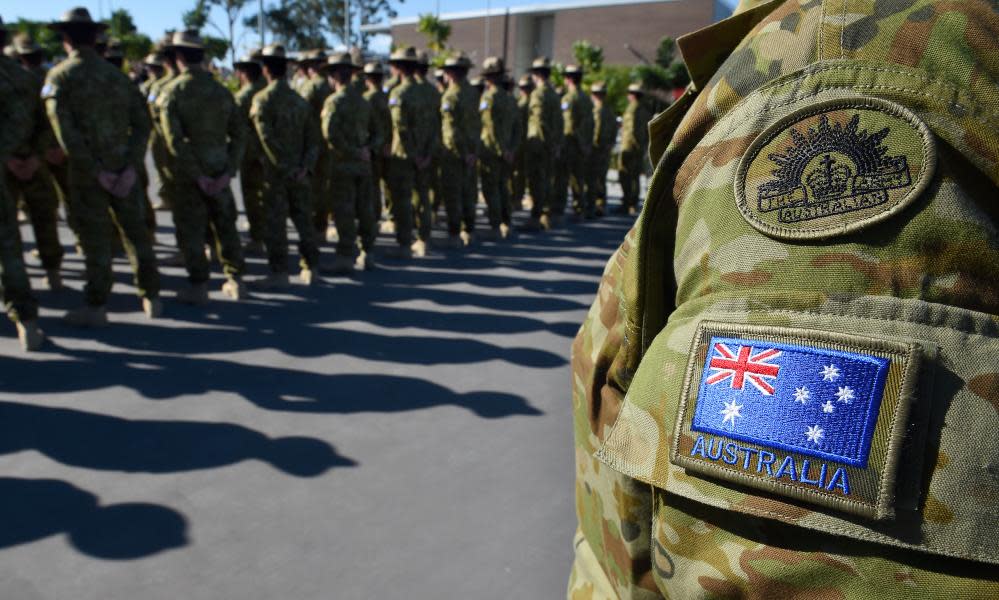Ministers should explain ‘legal basis’ for Australia going to war to avoid another Iraq, inquiry says

An inquiry has called for the government to be made to explain to parliament the “legal basis” for sending Australian troops to war, in an apparent bid to avoid a repeat of the Iraq war debacle.
According to proposals published on Friday, changes to the Australian government’s processes for sending troops to international conflicts would include requiring the parliament to be recalled to allow for a debate.
A new parliamentary defence committee may also be set up to give MPs and senators access to sensitive intelligence briefings.
But the recommendations will disappoint campaigners for substantial war power reform, because the report does not go as far as calling for a binding parliamentary vote that could, in effect, veto a cabinet decision to join a conflict.
Most of the submissions to the joint standing committee on foreign affairs, defence and trade had called for more substantial changes.
Related: Labor’s opposition to Iraq war ‘vindicated’, Richard Marles says
The committee launched the inquiry after a referral from the defence minister, Richard Marles, who had made clear from the beginning that he was “firmly” against giving parliament a veto power but supported more transparency.
Labor and the Coalition members of the committee agreed that decisions regarding armed conflict were “fundamentally a prerogative of the executive” but parliament should play a key scrutiny role.
The seven recommendations include rewriting the cabinet handbook to “require a written statement to be published and tabled in the parliament setting out the objectives of major military operations, the orders made and their legal basis”.
Sign up for Guardian Australia’s free morning and afternoon email newsletters for your daily news roundup
The amended cabinet handbook would also require parliament “to be recalled as soon as possible to be advised and facilitate a debate in parliament at the earliest opportunity after a ministerial statement”.
This should include “a statement of compliance with international law and advice as to the legality of an operation”.
While Australian Defence Force personnel remain deployed overseas, the prime minister should make a statement to parliament at least once a year on the objectives.
The committee also weighed in on which power should be used to deploy troops, “particularly in relation to conflicts that are not supported by resolution by the UN security council” like the Iraq war.
It said section 61 of the constitution – where the governor general gives effect to a decision based on advice of the government – would be better than using the defence minister’s powers under section 8 of the Defence Act.
The Labor MP Josh Wilson said decisions about Australia’s involvement in war were “the gravest calls that government will ever make”.
“In the past some of those decisions have been made badly and some of those decisions have been wrong and enormously harmful,” Wilson said on Friday.
The chair of the defence subcommittee, Julian Hill, said the report proposed “sensible changes that respect our well-established institutions and conventions”.
But the campaign group Australians for War Powers Reform said the inquiry had failed to deliver “the genuine reform many in the community expect”.
“It reaffirms the status quo by insisting that decisions regarding armed conflict are fundamentally up to the PM and the executive,” the group’s president, Alison Broinowski, said.
“While some of the recommendations are welcome, such as the requirement that parliament must be given a statement of compliance with international law about military action, such advice is not much use if parliamentarians are only ‘consulted’.”
The report called for a new defence committee modelled on the parliamentary joint committee on intelligence and security.
It would be “able to receive classified information to improve parliamentary scrutiny of defence strategy, policy, capability development acquisition and sustainment, contingency planning and major operations”.
This committee would probably comprise members of the major parties, in a move criticised by the Greens, who have been campaigning for substantial reform to prevent a repeat of the Iraq war debacle.
The Greens have called for urgent changes “so that we are never again dragged to war based on the lies of politicians”.
In a dissenting report, the Greens said they would support the new defence committee only “if it included a legislated requirement for crossbench members from both houses of parliament to be members of the committee”.
The Greens argued Australia was “an international outlier on transparency”.
Related: Australia’s defence force faces once in a generation shake-up – but to what purpose?
The party’s spokesperson for peace and foreign affairs, Jordon Steele-John, called for the release of any legal advice given to the Howard government “so that Australians can determine for themselves what was understood about entering Iraq”.
He repeated his call for a binding parliamentary vote after the major parties voted down his proposed legislation on Wednesday.
Steele-John’s bill would “insert a new section into the Defence Act 1903 under which service of members of the defence force beyond the territorial limits of Australia in warlike actions would require the approval of both houses of the parliament, with certain exceptions”.
A spokesperson for Marles said the government would carefully consider the committee’s report and respond in due course.

 Yahoo News
Yahoo News 
